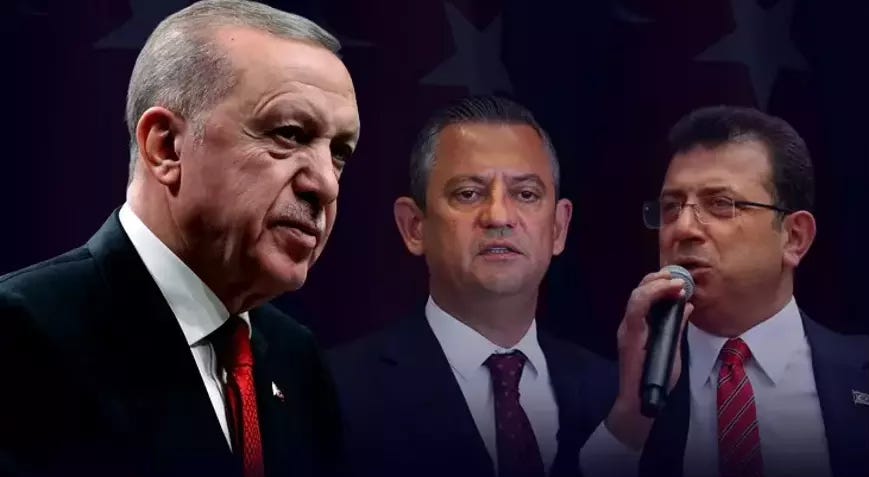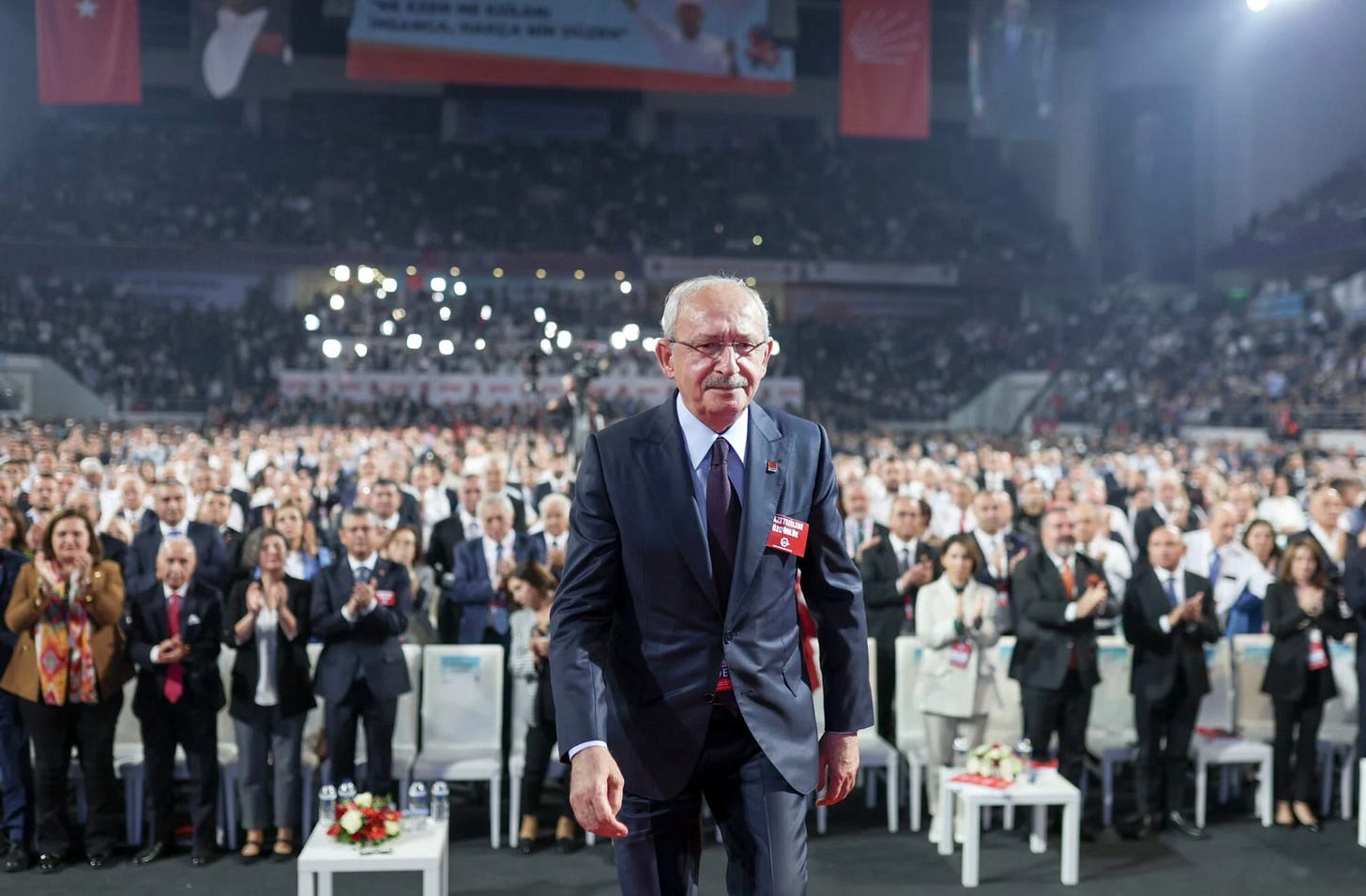Legal Blitz: Can Turkey’s Main Opposition Survive the Hurricane?
A court ruling threatens to dismantle the CHP and reshape the political landscape. With the ruling bloc’s dual strategy of repression/co-option, meaningful opposition may soon be a thing of the past.
Turkey’s slide into full-fledged authoritarianism is accelerating. President Recep Tayyip Erdoğan and his ultranationalist ally Devlet Bahçeli are deepening efforts to weaken and tame the opposition, this time by targeting the country’s main secular party, the Republican People's Party (CHP).
An Ankara court is set to rule on Monday, June 30, on whether to annul the CHP’s landmark 2023 leadership congress. The decision could dismantle the party’s current leadership, force it into state trusteeship, and shake Turkey’s fragile political balance.
At the heart of the case is a broader power play. Erdoğan, who is maneuvering to extend his presidency indefinitely, appears determined to eliminate all obstacles to his strategic ambitions.
The roots of this legal battle trace back to the May 2023 general elections. The opposition had cobbled together a six-party alliance—mirroring the Hungarian model—to challenge Erdoğan’s ruling AKP. However, endless talks and divisions quickly emerged, especially over the candidacy of Istanbul’s popular mayor Ekrem Imamoğlu. Despite widespread public support, the alliance sidelined him in favor of then-CHP leader Kemal Kılıçdaroğlu—a choice neither polls predicted as winning, nor many voters found inspiring.
Having lost 12 consecutive elections, Kılıçdaroğlu still refused to resign after the defeat. It took five months of internal strife before the party organized a leadership congress. In November 2023, Özgür Özel unseated him in a generational shift that brought new energy to the CHP.
The 2024 local elections gave the party further momentum, particularly after Erdoğan’s base showed signs of erosion due to a worsening economy. Imamoğlu retained Istanbul in a key victory, emerging as Erdoğan’s strongest rival —emboldened further to raise his voice.
The ruling bloc responded quickly. Government-aligned prosecutors launched investigations into the 2023 CHP congress, citing alleged vote-buying and delegate manipulation. Witnesses from within the party claimed cash bribes were offered to delegates, as the CHP objected that there was no hard evidence.
But, nobody could deny the political character of the indictment.
The case seeks to:
Invalidate the entire congress,
Suspend or arrest key CHP figures including Özel,
Appoint a state trustee to run the party.
In effect, a party founded by Mustafa Kemal Atatürk to establish and protect secular democracy, as old as the republic, now finds itself fighting for survival.
Monday’s ruling—unless delayed—could determine whether any real opposition can exist in Turkey moving forward.
If the congress is annulled, the CHP could fracture under pressure. Özel, who was elected on promises of renewal, would lose his mandate. Though he denies any wrongdoing and retains support from all 81 provincial chairs, a legal defeat could force his exit and unleash internal chaos.
Central to the legal offensive is Imamoğlu. The mayor, already jailed since March 2025 on corruption charges, is named in the indictment as a key actor in the alleged vote-buying scheme. He also faces separate charges related to municipal corruption, with a possible conviction threatening years in prison and a political ban.
Meanwhile, Kılıçdaroğlu continues to challenge the new leadership. Despite his 2023 loss, he openly entertains the idea of a return—possibly through court intervention—arguing that resisting a trustee appointment would only "hand the party to the state." If the court annuls the congress, a snap party election would be required within 45 days, setting the stage for renewed infighting.
“The legal actions against İmamoğlu, the CHP, and Istanbul Municipality reflect a broader authoritarian impulse,” writes Sinem Adar, a senior researcher at SWP Berlin. “This is about eroding competitive politics via the instrumentalisation of the judiciary, and simultaneously demoralizing opposition actors.”
If the court rules against the CHP, Turkey’s oldest political party may face a state-controlled overhaul. However, if the ruling favors Özel, Erdoğan’s government is likely to escalate attacks via other legal channels.
Either way, the AKP benefits: it’s disabling organized opposition well before the next electoral cycle. If Imamoğlu receives a political ban, snap polls could also be on the table.
The “opposition engineering” doesn’t stop with the CHP. It’s increasingly clear that the ruling bloc has set its sights on the pro-Kurdish DEM Party as well. With 57 seats in Parliament, the DEM Party is pivotal to Erdoğan’s ambitions to amend the Constitution, potentially cementing an even more centralized presidential system and a lifetime rule.
In a parallel development, the PKK’s recent decision to annul itself—though not fully disarm—has brought the DEM Party into closer talks with the government. The party appears hopeful for concessions related to the imprisoned PKK leader Abdullah Öcalan, under the banner of “peace”—a term overused in Turkey’s political theatre.
Talks are currently underway in Parliament to form a vaguely defined “solution commission,” though many observers see this as another tactic to divide the opposition. The CHP, under siege, views the process with skepticism.
“How is peace ever possible,” ask party insiders, “when the government is waging war against the main opposition?”
The ruling bloc’s dual-track strategy—repression of one opposition wing and reformist dialogue with the other—has successfully muddied —if not fractured— opposition unity. The DEM Party, clinging to an unusual optimism at a time of increased tension, is now perceived by some within the CHP as playing into Erdoğan’s hands.
“Since day one,” notes Adar, “Turkey’s rulers have selectively deployed ‘reform’ and ‘repression’ to redesign the political landscape. It’s a test of domination and loyalty.”
Indeed, “opposition engineering” is a familiar playbook in autocracies like Russia, Belarus, and Azerbaijan. Erdoğan and Bahçeli are deploying similar methods: using the judiciary, media, and security apparatus under the banner of an “internal front” to force political actors into compliance, supposedly to resist foreign (“imperialist”) interference.
This authoritarian push coincides with the ruling bloc’s vision of a “New Turkey”—a synthesis of Islamism and nationalism that aims to redefine national identity. In this context, taming or restructuring opposition parties seems not a means to an end; it’s central to the regime’s long-term survival.
With international attention diverted, Erdoğan’s calculus appears correct. The Trump administration has shown no interest in Turkey’s domestic turmoil, which is marked by oppressive measures.
The EU, wary of jeopardizing migration deals and —especially now— defense cooperation, remains largely mute. The global response to Turkey’s creeping authoritarianism has been tepid at best.
Time may indeed be ripe for Erdoğan’s next leap. As legal cases multiply and the judiciary becomes increasingly politicized, the stage is being set for a new phase of regime consolidation—one where opposition parties exist in name only, stripped of autonomy and legitimacy.
Monday’s verdict could mark a turning point. Whether it triggers the collapse or co-optation of the CHP, one thing is clear: Erdoğan’s strategy of engineered polarization, selective repression, and constitutional manipulation is advancing unchecked.
The question now is not just whether the CHP survives—but whether any meaningful opposition can endure in Turkey’s political future.





